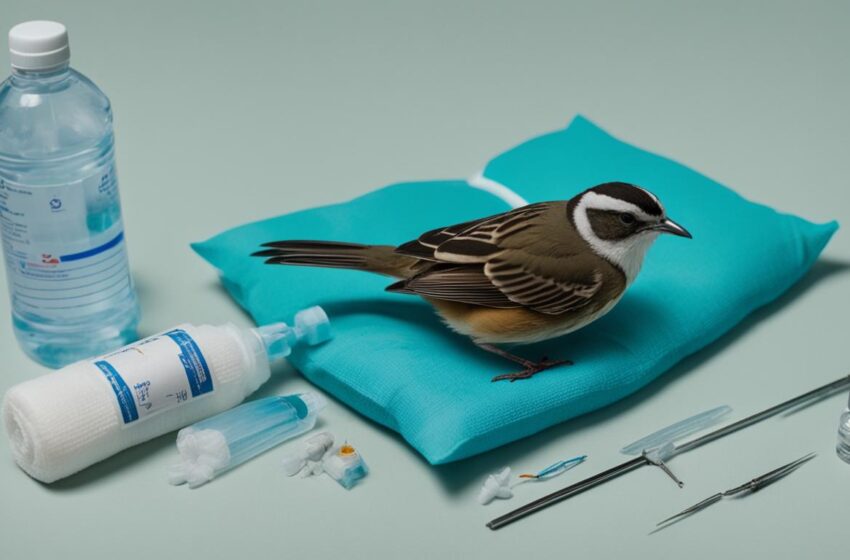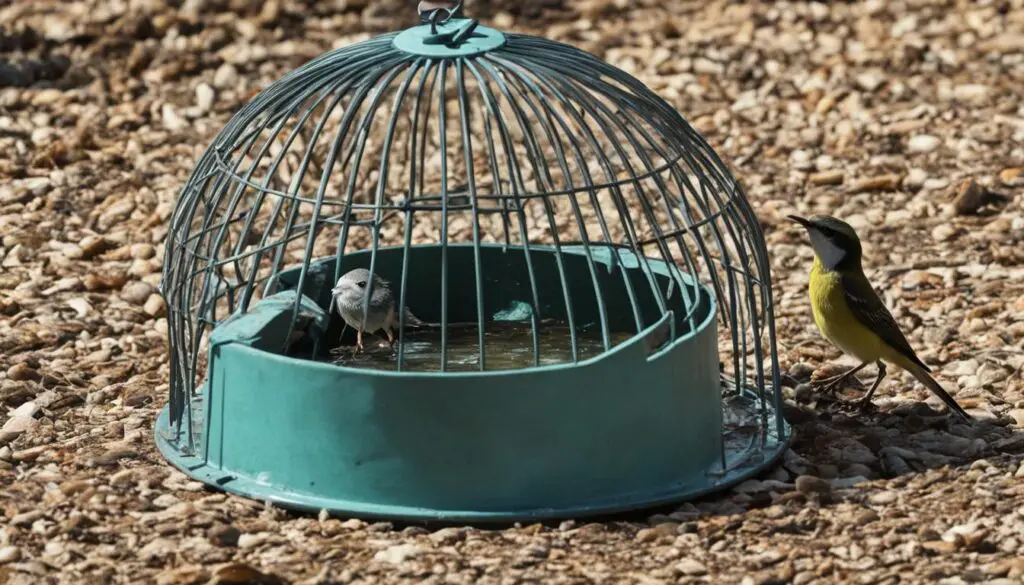Emergency Care Tips for Small Bird Owners

As a small bird owner, it is crucial to be prepared for emergencies and have the knowledge to provide the necessary care for your feathered friend. When faced with an emergency, swift action and appropriate care can make all the difference in ensuring your bird’s well-being.
Understanding the common emergencies that small birds may encounter and knowing how to respond effectively is vital. By being prepared and equipped with the right information, you can minimize stress and provide the necessary care to help your bird recover.
Key Takeaways
- Being prepared for emergencies is essential for small bird owners.
- Recognizing signs of emergency situations in small birds is crucial.
- Providing immediate first aid can significantly impact the outcome of an emergency.
- Understanding common emergency scenarios and how to respond is essential.
- A well-stocked emergency kit can ensure you are ready to handle unforeseen situations.
Identifying Emergency Situations
As a small bird owner, recognizing the signs of an emergency situation is crucial for the well-being of your feathered friend. By being vigilant and observant, you can quickly identify when your bird is in distress and take appropriate action.
Some common signs of emergency situations in small birds include:
- Difficulty breathing: If you notice your bird struggling to breathe or exhibiting rapid, shallow breathing, it could be a sign of respiratory distress.
- Changes in plumage or coloration: Sudden changes in your bird’s feathers, such as discoloration or loss of feathers, may indicate an underlying health issue.
- Loss of appetite: A significant decrease in your bird’s food intake can be a sign of illness or discomfort.
- Sudden weight loss: If you observe a rapid and unexplained decrease in your bird’s weight, it could be an indication of a serious health problem.
- Abnormal behavior: Pay attention to any unusual behaviors, such as lethargy, excessive vocalization, or the bird’s inability to perch properly.
If you notice any of these signs or any other concerning behavior in your small bird, it is essential to take immediate action. Quick intervention can make a significant difference in the outcome of an emergency situation.
Remember: Trust your instincts and seek veterinary help as soon as possible. A veterinarian with avian expertise can provide a proper diagnosis and recommend the necessary treatment to ensure your bird’s well-being.
Next, let’s explore the essential first aid measures you can take while seeking professional help in case of an emergency.

Common Signs of Emergency Situations in Small Birds
| Signs of Emergency Situations | Description |
|---|---|
| Difficulty breathing | Struggling to breathe or exhibiting rapid, shallow breathing |
| Changes in plumage or coloration | Sudden changes in feathers, such as discoloration or loss |
| Loss of appetite | Significant decrease in food intake |
| Sudden weight loss | Rapid and unexplained decrease in weight |
| Abnormal behavior | Unusual behaviors like lethargy, excessive vocalization, or difficulty perching |
First Aid for Small Birds
Providing immediate first aid can significantly impact the outcome of an emergency situation for small birds. When facing an emergency, it is essential to keep calm and take quick action to ensure the well-being of your feathered friend.
General First Aid Measures
Here are some general first aid measures you can take when providing emergency care for small birds:
- Keep the bird warm and quiet: Small birds are vulnerable to temperature changes, so make sure to create a warm and calm environment for them. You can use a heating pad, a heat lamp, or a warm towel to help regulate their body temperature.
- Minimize stress: In emergency situations, it’s important to minimize stress for the bird as much as possible. Keep noise and activity levels low, and avoid unnecessary handling.
- Stop bleeding: If you notice any bleeding, gently apply pressure to the wound with a clean cloth or gauze. This can help slow down or stop the bleeding until you can seek veterinary assistance.
- Immobilize fractured limbs: If you suspect a fractured limb, carefully immobilize it using a splint made of popsicle sticks or a similar material. Be cautious not to apply too much pressure or restrict blood flow.
It’s important to note that first aid should only be administered if it can be done safely and without causing further harm to the bird. If you’re unsure or the situation seems severe, seeking veterinary assistance as soon as possible is always recommended.
Remember, providing prompt and appropriate first aid can be critical in ensuring the best possible outcome for small birds in emergency situations.
Common Emergency Scenarios and How to Respond
Small birds can encounter various emergencies that require immediate attention and appropriate action. It is essential to act quickly and responsibly to ensure the well-being of your feathered companion. Below are some common emergency scenarios that small bird owners may encounter and the recommended responses:
Ingestion of Toxic Substances
If your small bird ingests something toxic, it is crucial to contact a veterinarian immediately. Provide the veterinarian with any relevant information about the substance ingested, such as the name, amount, and time of ingestion. The veterinarian will be able to guide you on the necessary steps to minimize the potential harm to your bird.
Physical Injuries
When your small bird sustains a physical injury, it is important to handle the bird with care. Gently and securely hold the bird to prevent any further harm. Seek immediate veterinary care for a thorough examination and appropriate treatment. Prompt medical attention can significantly improve the chances of a successful recovery.
Respiratory Distress
If your small bird is experiencing respiratory distress, such as difficulty breathing or wheezing, it is crucial to seek immediate veterinary assistance. Respiratory issues can be life-threatening for birds and require prompt attention from a veterinarian trained in avian medicine.
Egg-Binding
Egg-binding is a condition when a female bird is unable to lay her eggs. If you suspect that your small bird is experiencing egg-binding, contact a veterinarian experienced in avian reproductive issues. They will provide guidance on how to care for your bird and assist with the egg-laying process if necessary.
Understanding how to respond to these common emergency scenarios is vital in providing the necessary care for small birds. Immediate action and seeking professional help from a veterinarian experienced in avian medicine can greatly increase the chances of a positive outcome for your feathered friend.

Preparing an Emergency Kit
As a small bird owner, I understand the importance of being prepared for any emergency that may arise. That’s why having an emergency kit readily available is essential. This kit should include a range of essential supplies to ensure that you are well-equipped to handle any unforeseen situation.
A Comprehensive Emergency Kit
1. Carrier or Travel Cage: Having a carrier or travel cage is crucial for safely transporting your small bird during an emergency. It provides a secure and comfortable space for them.
2. Clean Towels or Cloths: These are necessary for handling the bird and keeping them clean and comfortable. Make sure to wash them regularly to maintain hygiene.
3. Extra Heating Source: Small birds are susceptible to changes in temperature, so having an extra heating source like a heat lamp or portable heater can help regulate their body temperature in case of power outages or cold weather emergencies.
4. First Aid Kit: A well-stocked first aid kit is essential for providing immediate care in case of injuries or accidents. It should include items such as antiseptic solution, bandages, gauze pads, and small scissors.
5. Contact Information of Avian Veterinarian: Keep the contact information of a nearby avian veterinarian readily available. In case of an emergency, you can quickly reach out to them for professional advice and guidance.
“Creating and maintaining an emergency kit is a proactive step towards ensuring the safety and well-being of your small bird. It allows you to respond swiftly and effectively during unexpected situations.”
Regular Check and Restock
It’s important to regularly check your emergency kit and ensure that all supplies are in good condition and within their expiration dates. Routines should be established every few months to restock any items that have been used or expired. This will ensure that your emergency kit is always ready for action.
With an emergency kit in place, you can have peace of mind knowing that you are well-prepared to handle any emergency that arises with your small bird. Stay proactive and prioritize the safety and well-being of your feathered friend.
Conclusion
Providing emergency care for small birds requires quick thinking, preparedness, and a calm approach. By familiarizing yourself with common emergencies, knowing how to respond, and having an emergency kit on hand, you can be better prepared to handle any unexpected situations that may arise. Remember to always prioritize the well-being and safety of your small feathered friend and seek veterinary help when necessary.
FAQ
What are some common signs of an emergency in small birds?
Some common signs of an emergency in small birds include difficulty breathing, changes in plumage or coloration, loss of appetite, sudden weight loss, and abnormal behavior.
What should I do if I notice these signs in my small bird?
If you notice any signs of an emergency in your small bird, it is important to take quick action and seek veterinary help as soon as possible.
What first aid measures can I take for my small bird in an emergency situation?
Some general first aid measures for small birds in an emergency situation include keeping the bird warm and quiet, minimizing stress, applying gentle pressure to stop any bleeding, and carefully immobilizing any fractured limbs. However, it is important to remember to administer first aid safely and without causing further harm to the bird.
What are some common emergency scenarios that small birds may face?
Small birds may face emergencies such as ingestion of toxic substances, physical injuries, respiratory distress, and egg-binding.
How should I respond to a small bird ingesting something toxic?
If your small bird ingests something toxic, it is important to contact a veterinarian immediately and provide any relevant information about the substance ingested.
What should I do if my small bird is injured?
If your small bird is injured, gently handle the bird and seek immediate veterinary care.
What items should I include in an emergency kit for my small bird?
An emergency kit for small birds should include items such as a carrier or travel cage, clean towels or cloths for handling the bird, an extra heating source, a first aid kit, and the contact information of a nearby avian veterinarian.
How can I better prepare for emergency situations involving my small bird?
To better prepare for emergency situations involving your small bird, familiarize yourself with common emergencies, know how to respond, and have an emergency kit readily available.



